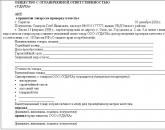What is the duration of a disciplinary action? The duration of the disciplinary sanction is...
Employment relationships don't always go smoothly. Employees, for various reasons, commit misconduct related to the performance of work duties. In this case, the employer applies disciplinary measures to the employee. Most often this is a remark or reprimand, but sometimes it comes to dismissal. There are other ways to punish the offending staff member. A disciplinary sanction lasts for one year unless the disciplinary sanction is removed sooner or the employee is subjected to another disciplinary action.
What is disciplinary punishment
In the process of labor activity, the employee is obliged to fulfill the duties assigned to him, to preserve the property of the employer and to comply with the established routine. In case of non-compliance with these requirements, the employee is subject to punishment. The disciplinary sanction is valid for a year, and it is imposed for a misconduct related to labor activity.
To include:
- failure to perform official duties;
- negligent or incomplete performance of the assigned work;
- non-compliance with the established labor schedule - being late, absenteeism, leaving the workplace ahead of time;
- causing damage to the property of the employer;
- disclosure of trade secrets;
- violation of safety regulations, regardless of the consequences;
- non-compliance with instructions for using the equipment;
- refusal to improve qualifications or training, if this is provided for by the job description or the standard of the profession.

Depending on the field of activity and the characteristics of production, both the procedure for applying disciplinary sanctions and the list of violations will change. They must be mandatory prescribed both in the collective labor agreement and in individual instructions for positions and types of activities.
Types of disciplinary sanctions
If we take as a basis, then disciplinary sanctions include:
- dismissal;
- rebuke;
- comment.
It is in this very simple wording that they should be included in the corresponding order. Inexperienced personnel officers sometimes change their names, in which case the employee can appeal the order, indicating that only one of the list is a disciplinary sanction. And the commission on labor disputes in this case will be on the side of the staff.
What is not a disciplinary offense
Not all types of violations can be attributed to disciplinary offenses. Sometimes employees do not perform their duties, fearing punishment from management. It should be remembered that any labor function must be spelled out in the contract. Disciplinary sanctions include a remark and a reprimand, and they are applied for already indicated violations.
It is not a disciplinary offense and is not subject to recovery:
- the refusal of the employee to carry out the personal instructions of the employer;
- the employee's refusal to conduct public work, including absenteeism on subbotniks, demonstrations and rallies;
- refusal of additional work, if this obligation is not specified in the contract;
- employee's refusal to perform actions contrary to the law;
- refusal of any work not expressly prescribed in the employment contract;
- strike, if it is carried out in accordance with the norms of the law.
The procedure for imposing a penalty
Punishment of an employee requires adherence to clear rules. It has already been mentioned above that a disciplinary sanction is a reprimand or a remark. But dismissal is not used as often as other types, but it requires much greater responsibility from personnel officers.

To comply with the law, the following procedure for applying disciplinary sanctions is applied:
- Preparation of documents proving the fact of committing a misdemeanor. This is a laborious but mandatory step. It is necessary not only to know about the violation, but also to be able to prove its fact. Testimonies of two or more members of the labor collective, recordings of surveillance cameras, written complaints from clients, and expert assessment can be used as a base. Be sure to detect or commit a violation of labor discipline. The employee gets acquainted with him under the signature.
- An explanatory note must be taken from the employee on whom the penalty will be imposed. This document is necessary for various reasons. The employee is given a chance to justify himself, and perhaps the reason will be recognized as valid. Possible mitigation of punishment or the identification of new facts. The employee may not give a written explanation. In case of his refusal, an appropriate act is drawn up.
- Drafting an order. He wears a loose uniform. But for a disciplinary sanction, dismissal is issued a unified order to terminate the employment contract.
- Signing the order by the head and bringing it to the attention of the employee. If the employee refuses to sign, it is necessary to draw up an act and make a corresponding note in the document.
It should be remembered that a disciplinary sanction is applied no later than six months after the violation was committed and no later than one month from the day it was discovered. The calculation of this time does not include days of vacation, illness, business trips, and all other periods of time when the employee was absent from the workplace for a good reason. In addition, the time of consideration of documents on recovery by a representative body or a trade union is taken into account.
It is important to know that one type of penalty can be imposed on an employee for one misconduct. It is unacceptable to first reprimand an employee for being late, and then fire him for him.
Collection documents are stored in a separate folder, away from other papers on personnel. The period of their storage is the same as the usual period of validity of the penalty, at the end of the action, all acts, letters, explanatory and memorandums and orders are subject to destruction. Copies can be attached to the personal file, but at the end they should be deleted.

Duration of disciplinary actions
The period of validity of the disciplinary sanction is 12 months from the date of issuance of the order. If the employee commits another offense, then this period is extended until the end of the last one.
The ultimate punishment for an employee is dismissal. In this case, the action of the disciplinary sanction is indefinite and cannot be canceled by the administration. However, it can be terminated by the labor dispute commission and the employee reinstated in his position. A dismissed employee may be re-admitted to the enterprise in another division and on other conditions, in which case he is considered not to have a penalty.
The action of the disciplinary sanction may be terminated ahead of schedule. However, it is not recommended to reduce it by less than six months.
The order to impose a disciplinary sanction - what is the difference from other types of orders for personnel
An employee who has committed a misconduct is subject to disciplinary action in the form of a remark, reprimand, or, as a last resort, dismissal. Various documents are drawn up: protocols, acts, memoranda and explanatory notes, letters of complaint, etc. But the main thing is the order.
Most of the documents relating to personnel are unified. They are brought to a single form, for convenience and simplification of work. However, orders for reprimand or remark are issued freely. This is due to the fact that it is not possible to bring all variants of violations to a single form, they are specific to each organization.
Early withdrawal of penalty
The duration of the disciplinary sanction is usually one year. But it can be reduced:
- on the personal initiative of the employer;
- at the personal request of the employee;
- at the request of a trade union or other representative body;
- at the personal request of the immediate supervisor of the employee.
The employer may at any time apply early removal of a disciplinary sanction. A sample order or order will be similar to other non-unified personnel documents.
The employee may himself ask for the early removal of a remark or reprimand. In this case, they write a memorandum, and an application is attached. The same documents are drawn up by the trade union and the head of the unit. In case of early removal of the penalty, it will be considered that the employee did not have it. All supporting documents are destroyed.
Appeal of disciplinary action by staff
The employee has every right to appeal the penalty. To do this, he should apply to the district commission by decision. Further consideration of the case may be given to the prosecutor's office or the court. If the employer made gross mistakes in paperwork, or overlooked any stage, then the court decision will be on the side of the employee. If the collection is declared invalid, all documents about it are subject to destruction. If the employee was fired, then he is reinstated in his previous position. At the same time, he is paid compensation for all days missed at work in the amount of average earnings.
Dismissal is an extreme measure of disciplinary punishment
Of the three types of disciplinary punishment, dismissal is indefinite and often irreversible. This penalty is usually applied as a last resort, when the employee's misconduct is incompatible with the further performance of his official duties.

Misdemeanors leading to dismissal may include:
- a single gross violation of the prescribed labor discipline and work schedule;
- absenteeism without a valid reason;
- the absence of an employee at the workplace for four or more hours without a good reason;
- actions resulting in injury or death;
- employer, including those associated with insufficient competence;
- theft at the workplace of both the property of the employer and other employees, in addition, in this case, a criminal case may be initiated on behalf of the enterprise;
- not directly affecting the work, but worsening the image of the company;
- actions that discredit the employer;
- dissemination of confidential and secret information;
- gross non-compliance with work ethics and subordination;
- direct refusal to perform official duties prescribed in the contract;
- participating in a strike, without following the procedure prescribed by law.
When dismissed for a misconduct or other guilty act, the employer should take the most responsible approach to paperwork. In this case, there is a clear conflict of interest, and the employee may consider such a measure of punishment unlawful. In case of violations of the procedure for imposing a penalty, he can be reinstated by the courts or the labor inspectorate.

First of all, personnel officers should prepare evidence confirming the guilt of the employee. It must be two or more members of the labor collective, and they must be witnesses of misconduct. Documented expert opinions would be helpful. You should also use any technical materials confirming the misconduct: recordings from CCTV cameras, auto-registration indicators, photographs of the workplace with the date and time.
A written explanation of the misconduct must be requested from the employee. This document, along with others, is sent to the representative body for consideration. They must decide on the legality of imposing a punishment in the form of dismissal.
The last document is an order or instruction, its form is unified. An appropriate entry is made in the work book, with the wording from the labor code and a mandatory reference to the article.
Consequences of disciplinary punishment for the employee and the employer
All measures of disciplinary sanctions cause not only economic, but also psychological harm to the personnel. After receiving the first notice, there may be a significant decrease in labor enthusiasm and an even greater deterioration in production performance.
However, such a negative incentive may have a positive effect in the future. The employee begins to take a more responsible attitude to the production process, monitors the working regime and improves his skills.
The employer should consider how this or that type of punishment will affect the production process. Do not punish employees for the slightest minor misconduct. Being late for a couple of minutes is a reason to express dissatisfaction, but not so significant as to make an official reprimand. As a result, the employer who abuses penalties develops a bad reputation in the labor market, and it becomes increasingly difficult for him to find new employees.

Disciplinary action affects both the employee and the organization. Employees should understand that such a measure of influence is often forced and almost always temporary. With further observance of discipline, the duration of the punishment will be a year, or maybe less.
Popular
- How to get a TIN: possible ways
- What kind of business can you do?
- Written notice of termination of the lease
- Business from scratch. Things to do?
- Cost of goods sold: formula, methodology and calculation example
- How to write a vacation application - examples
- What kind of business can be opened in a small town or village?
- The formula for calculating the cost of services, products sold and total cost
- Sample memorandum: I bring to your attention
- Example of an explanatory note for being late for work




